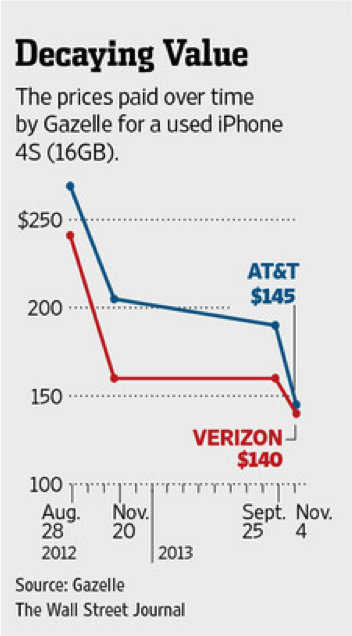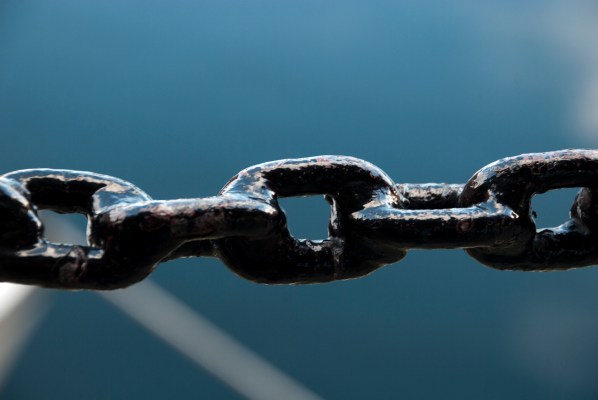Editor’s note: Derek Khanna is a technology policy consultant and columnist. He previously worked for the House Republican Study Committee where he authored their report on copyright reform. Hespearheaded the national campaign on cellphone unlocking that resulted in proposed legislation to legalize unlocking your phone. Derek regularly writes for The Atlantic, National Review and Forbes. Follow him on Twitter @DerekKhanna.
A year ago a ruling went into effect by the Librarian of Congress that made it a crime to unlock your cellphone (changing the settings on the phone to be able to be used on a different phone carrier). When that ruling went into effect, there was public outcry across the technology community that such a basic technology was now illegal to use.
Thousands of Americans became potential criminals for exerting their basic property rights by plugging their phones into their computers and running a simple computer program. The resale market for phones began to dry up and websites allowing unlocking shut down to avoid liability or stopped servicing US phones:

It was a clear case of crony capitalism on behalf of some of the largest companies with the largest lobbying shops in Washington, D.C. (Though it should be noted that over 100 wireless carriers, including T-Mobile and Sprint, were always against the ruling). Many big companies use their lobbying might to go after their competitors – that’s not particularly uncommon – but the phone companies are perhaps unique in also going directly after their own consumers.
The resulting public outcry, perhaps the largest online response since SOPA/PIPA, led the White House, FCC and Members of Congress to condemn the ruling by the Librarian of Congress and to support cellphone unlocking. One year later, despite an overwhelming consensus in favor of unlocking, unlocking your phone, without permission from your carrier, is still a crime. It’s difficult to find another issue that has such overwhelming and bipartisan support, and it’s difficult to understand why Congress still refuses to act.
Today, legislation is sitting in Congress to fix this problem that they have chosen not to vote upon.
A year ago the Atlantic published my piece The Most Ridiculous Law of 2013: It is Now a Crime to Unlock Your Phone. Many people were repulsed by this misuse of governmental power. Within the next month, a White House petition, created by Sina Khanifar, on this issue reached over 114,000 signatures, the first time a White House “We the People” petition has received over 100,000 signatures. As a response to the petition, the White House came out in full support of cellphone unlocking which cascaded into support from the FCC, Members of Congress and outside groups. Our campaign on cellphone unlocking resulted in multiple pieces of legislation being introduced with bicameral and bipartisan support.
Today, we, advocates of unlocking, have been unable to find anyone on or off Capitol Hill against fixing cellphone unlocking. This even includes the very organization that lobbied to make unlocking illegal: the Wireless Association (CTIA) fought to make unlocking illegal, and now, given the public backlash, claims publicly that they support legislation for unlocking (to effectively reverse their lobbying efforts). In a recent debate with Ben Sheffner (MPAA VP), he seemed to imply that even the MPAA, the organization that had been most involved in writing the underlying statute, would be supportive of efforts to solve this problem.
The verdict is in:
- Consumers like the freedom to unlock their devices and bring them to another carrier.
- The non-dominant phone companies, over 100 of them, like being able to compete with one another and encourage consumers to unlock their devices and bring them to their service (see T-Mobile advertising for consumers to unlock their phones).
- The market benefits from the competition that unlocking provides.
The stakes are the very future of the mobile market which is estimated to be a $341.4 billion market in 2015.
Legislation
How should Congress fix the problem? FCC Commissioner Ajit Pai’s explanation is on the solution is perhaps the most eloquent:
“Let’s go back to the free market. . . [allow consumers] to take their mobile devices from one carrier to another without fear [and] those who help consumers unlock their phones [shouldn’t] be prosecuted either. . . These fixes should be permanent, so that consumers [and] developers don’t have to worry about the law shifting on a whim.”
Congressman Bob Goodlatte (R-VA), H.R. 1123, has introduced one piece of legislation which is a stop-gate measure to reverse the decision of the Library of Congress temporarily and then allow for the Librarian to rule on this issue all over again. But, many organizations and supporters of the campaign on unlocking have argued that this legislation is insufficient as it would provide serious uncertainty to the market – in two years unlocking would likely be illegal all over again. Venture capitalists have discussed how they will not invest in such an uncertain market (included in my written testimony).
Many advocates have argued: if everyone now agrees that unlocking should be lawful – then should it not be lawful permanently?
Fixing this problem requires permanent legislation and ensuring that those developing the software and tools for unlocking are also free to do so (see my written testimony and comments to the Commerce Department on this issue). For these reasons, few outside organizations and experts consider H.R. 1123 to be a whole solution to the problem.
However, H.R. 1123 has passed the House Judiciary Committee and could be voted upon by the House under a suspension of the rules in short order – and Congress should do so immediately despite the legislation’s shortcomings (a stop-gate is better than the status quo).
Alternative legislation has been introduced by Reps. Zoe Lofgren (D-CA), Anna Eshoo (D-CA), Jared Polis (D-CO) and Thomas Massie (R-KY), H.R. 1892, which would legalize technologies like cellphone unlocking permanently but would also legalize other technologies without infringing purposes, such as jail breaking (rooting) of devices. This legislation has received widespread endorsements from activists, technology experts and think-tanks including R Street, FreedomWorks, Generation Opportunity, Cascade Policy Institute, Harbour League, Let Freedom Ring, Public Knowledge and Electronic Freedom Foundation.
As the House Judiciary Committee is having a series of hearings on reforming copyright law, Congress should have a hearing on this legislation without delay – thus far none have been announced. This is the only legislation that permanently addresses the problem at hand and provides certainty to the market.
Trans-Pacific Partnership Treaty
Unfortunately, while the White House has claimed to support cell phone unlocking, the U.S. Trade Representative is currently negotiating for a major international trade agreement which could make any permanent fix on unlocking impossible. The Trans Pacific Partnership Treaty, being secretly negotiated by 400 industry representatives, affects 40 percent of U.S. imports and exports and includes 12 countries.
While the treaty has been shrouded in extreme secrecy (as a Congressional staffer I couldn’t read the treaty) from leaked versions of the treaty we know that the US has been negotiating for a version of the TPP which would make any permanent solution on cellphone unlocking impossible. If the TPP treaty is signed and ratified, with the current language still intact, it would make permanently fixing cellphone unlocking impossible.
This seems like a classic example of policy laundering – companies were losing this argument with the public and with Congress so now they are secretly inserting an anti-free market provision in a free trade agreement.
Federal Communications Commission
At the same time, the Federal Communications Commission (FCC) has not waited for Congress to act. The FCC exerted significant pressure upon the phone companies: “Enough time has passed, and it is now time for the industry to act voluntarily or for the FCC to regulate.”
As of December 12, the major phone companies agreed to allow their consumers to unlock their devices. While this development was terrific news for consumers and a massive step forward, it still kept the technology itself illegal. This means that if a consumer chooses to unlock his or her own device without permission, let’s say when they travel abroad, it is still a felony punishable by five years in prison. Which is why this unilateral decision by companies needs to be coupled with Congressional action to solve the underlying problem that Congress created.
Further, some of the unilateral agreements that the phone companies agreed to may be more bark than bite. In the Wireless Association’s letter they claim that they already have “competitive and robust unlocking policies,” which was a similar claim that they made in 2012. That claim was shown to be untrue by the Commerce Department when they investigated consumer’s ability to unlock their phones. If phone companies say that they will allow consumers to unlock, but then create burdens to make it effectively impossible as they have done in the past, then consumers are the ones who lose.
 Therefore, given the demonstrated duplicity of these companies, consumers must have the ability to use this technology with or without their permission. If consumers own the property, they should be able to use the property as they see fit.
Therefore, given the demonstrated duplicity of these companies, consumers must have the ability to use this technology with or without their permission. If consumers own the property, they should be able to use the property as they see fit.
And there is other reason for concern. Businesses offering smartphone trade-in programs like Gazelle, the nation’s leading consumer electronics trade-in site, have found that purchasers of phones, acquired from customers that are eligible for unlocking, are being denied access to unlocking by carriers, even though the same phones are routinely unlocked when taken as a trade-in by those same carriers. The voluntary agreement with the FCC does not clearly address this circumstance.
The Wall Street Journal has reported that this has been devastating to the independent resale market for eligible phones. As can be seen from this graphic in the Wall Street Journal (right), the lack of availability of unlocking has had a serious impact upon the resale market.
A free market will empower a thriving phone resale market. It’s time to remove the legal and regulatory barriers.
Conclusion
So today, one year after the Librarian of Congress’s ruling, Congress needs to act quickly. It’s been a year, it’s time to have its first real hearing on this issue and invite a number of different voices to express their perspectives. Since H.R. 1892 is the only legislation that has received wide support, it therefore deserves a real hearing.
As the House Judiciary Committee is evaluating how to bring copyright into the 21st century they should investigate, how do old copyright policies affect technologies? Specifically: Why is unlocking your phone a copyright issue to begin with? And, should we continue to delegate decisions on what technologies to ban to the Librarian of Congress?
Image by Flickr user David Kirkham under CC BY-ND 2.0 license
This piece originally ran on Politix
